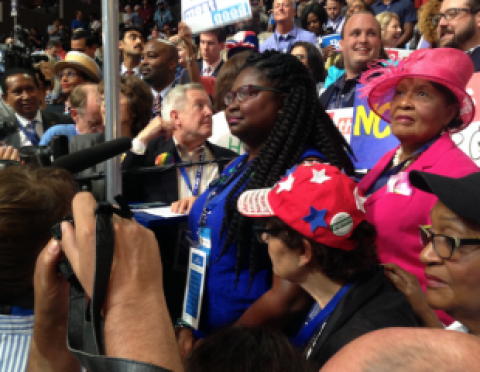More than a dozen progressive groups are urging the Democratic National Committee’s post-2016 Unity Reform Commission to recommend the party end its superdelegate system, where one-sixth of those nominating the presidential candidate are chosen before primaries and caucuses.
“On behalf of our more than 12 million members, we urge the Commission to recommend the full elimination of superdelegates’ power to overrule the will of Democratic primary voters in selecting the party’s presidential nominee,” the groups wrote in a letter released Thursday, in anticipation of the Unity Commission’s final meeting this weekend.
“If this is not the Commission’s final recommendation, the Commission should at the very least follow the mandate from the Democratic National Convention’s Rules Committee to reduce the voting power of superdelegates by approximately two-thirds,” said the letter, which was co-signed by the Center for Popular Democracy, Courage Campaign, CREDO Action, Demand Progress Action, MoveOn.org, National Nurses United, NDN, Other98, Our Revolution, Progressive Change Campaign Committee, Progressive Democrats of America, RootsAction.org and Social Security Works.
The Unity Commission's recommendations will come before the DNC, which will then decide what to do.
While many features of the DNC’s 2016 nominating process were anti-democratic, none are as high profile as the party's so-called superdelegates. These at-large national convention delegates were 712 federal and state elected officials, state party leaders and lobbyists whose votes counted toward the 2,384 needed for the presidential nomination. Most were with Hillary Clinton before Bernie Sanders entered the race and 570 stayed with her.
Other nominating season features that were biased against Clinton’s opponents and grassroots activists included decisions by then-DNC Chairwoman Debbie Wasserman Schultz to schedule televised debates on weekends, when audiences were smaller; shutting access to the DNC voter database as Sanders’ donations soared; establishing a joint fundraising operations with the Clinton campaign before she was the nominee; and unprofessional and opaque behavior at caucuses in key states like Iowa and Nevada, where actual vote totals are not released.
To many progressives, generally, and Berniecrats in particular, the superdelegates stand apart and exist for one purpose: to take the nomination away from voters. While party brass said that has not happened, and never would happen, their continued existence in 2017 reminds Berniecrats of last years' wounds. They also undermine the Democrats’ moral authority to criticize blatant and often racist efforts by the GOP to disenfranchise voters, especially nonwhites in blue epicenters.
Both of these criticisms were in the group letter to the DNC's unity commission.
“The system undermines representative democracy and means that the electorate is not necessarily decisive in determining who will be the Democratic nominees for president and vice president and dilutes the voters’ say over the party’s platform and the rules under which it operates,” their letter said. “Astonishingly, these unelected delegates have essentially as much weight as do the pledged delegates from 23 states, the District of Columbia, Democrats Abroad, and four territories combined.”
“We urge the members of the Unity Reform Commission to recommend an idea whose time has come: to end the superdelegate system and create a fair, transparent, and inclusive presidential nomination process in which Democratic primary voters can rest assured their voices will not be overruled by well-connected elites,” they concluded. “But at a minimum, the Commission should implement the guidelines in its founding directive to dramatically reduce the voting power of superdelegates.”
Longtime DNC members contacted by AlterNet said the Unity Commission was likely to recommend changes in its superdelegate system and primary elections, but said these would likely fall short of the progressives' demand.
The commission could reduce the number of superdelegates by not making members of Congress automatic delegates. It could require the superdelegates not endorse any candidate until after the final nominating season contest. Similarly, it could recommend state parties to open their primaries to independents—just not anyone already registered with another party.
These were some of the ideas being talked about, said Debra Kozikowski, the Massachusetts Party vice-chair, a grassroots activist for three decades and a superdelegate. She said most superdelegates had “come up through state party ranks and have worked hard to represent constituents for 20 or 30 years. They've been elected within the party. Why would we vote ourselves out of existence?”
Kozikowski is not on the Unity Commission, but said she expects it to take steps to curtail superdelegates from prematurely endorsing candidates and would tell state parties to hold more open primary elections.
“I hope these things will be brought up and I hope they will get enacted,” she said, speaking personally. “My stand is superdelegates should keep their super mouths shut, not endorse until the last state votes. Technically, we are at-large delegates.”
Kozikowski also hoped the commission would push state parties to move away from caucuses and embrace more open primaries, such as what Massachusetts does and New York does not. In Massachusetts, anyone who hasn’t registered with a party can vote in its primaries. In contrast, New York only allows its participants to be voters who registered with the party at least six months earlier. That deadline, the nation’s longest, blocked last-minute enthusiasts in 2016 from participating.
Kozikowski said fellow DNC members have told her these proposals will be brought to the Unity Commission’s final meeting. Whether they will be adopted, and whether they will satisfy the party’s Berniecrat wing is a different question. With 2018’s elections looming, it remains to be seen if the Unity Reform Commission will live up to its name.
Steven Rosenfeld covers national political issues for AlterNet, including America's democracy and voting rights. He is the author of several books on elections and the co-author of Who Controls Our Schools: How Billionaire-Sponsored Privatization Is Destroying Democracy and the Charter School Industry (AlterNet eBook, 2016).


Spread the word